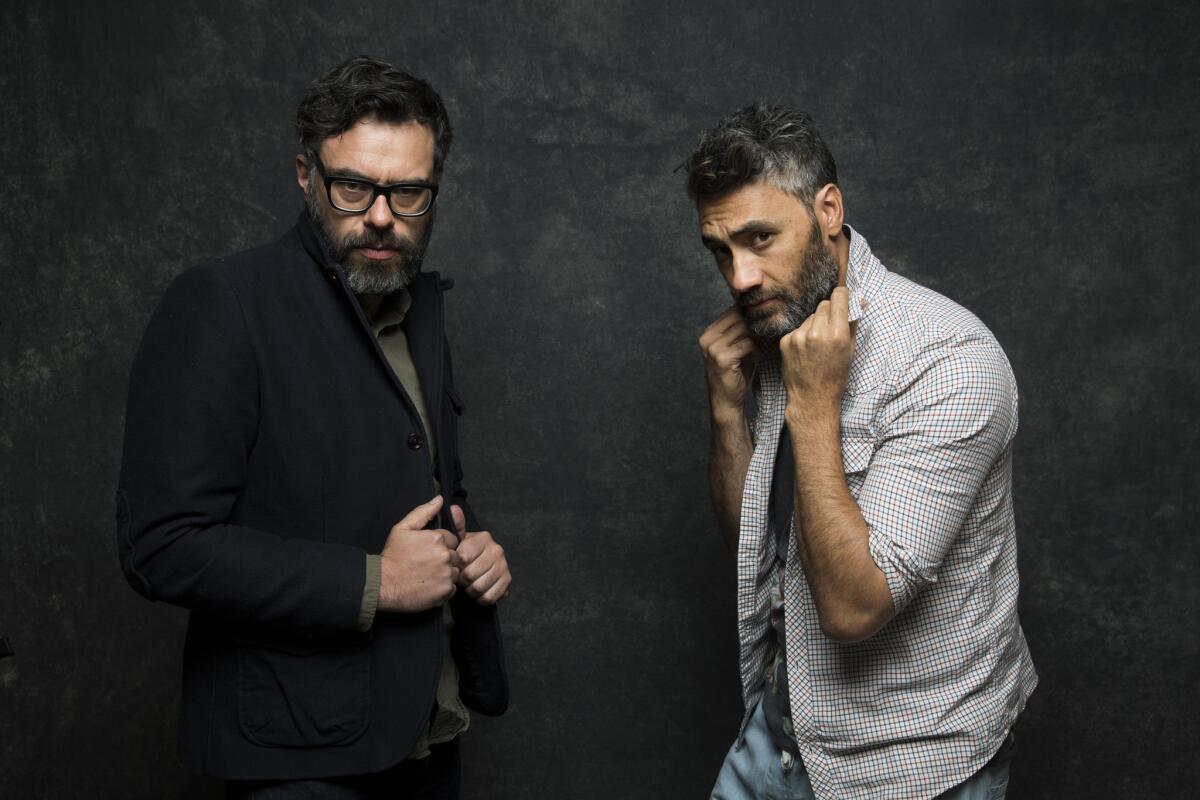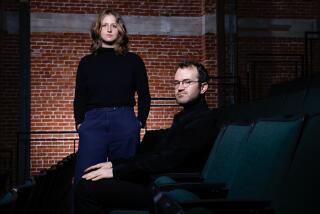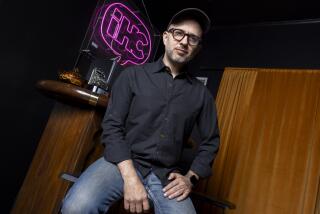Kickstarter Film Festival highlights site’s important but tricky role

Actors and co-directors, Jemaine Clement’ left, and Taika Waititi from the film “What We Do in The Shadows.”
It’s become almost de rigueur: After a scrappy indie doc or scripted feature plays at a film festival, a director gives a shout-out to Kickstarter.
Every once in a while, a higher-profile movie gets a citation too, as with Charlie Kaufman’s “Anomalisa,” a stop-motion movie that has already set the festival world afire. If the crowd-funding site’s involvement wasn’t clear to you as you watched the movie, the 1,000-plus Kickstarter names that scroll by during the credits ensure it doesn’t remain that way for long.
Those call-outs have highlighted how much Kickstarter has become a player in the indie film world -- even if, paradoxically, the idea, in some sense, is for it not to be a player at all.
“I think we provide something that’s truly beneficial to artists and practitioners of a craft,” said Yancey Strickler, Kickstarter’s co-founder and CEO. “But I would never ask someone to put our name on the credits,” he said -- then, describing a mission in which Kickstarter doesn’t intervene in a filmmaker’s work or make aesthetic judgments in what it approves, added, “And I believe in the moral rightness of creating. Which means that what you create won’t always be for everyone. And it won’t always be good.”
As he sits in a meeting room on Tuesday in his Brooklyn offices (a--what else--renovated pencil factory the company owns), Strickler described a firm that has become a surprisingly strong force in all manner of the creative arts, especially the visual form.
It is the same week that the company will mark its annual edition of the Kickstarter Film Festival. On Thursday, it will show a slate of about a half-dozen movies at 32 cities in North America and overseas -- an expansion by about tenfold from last year, when the films were shown only in Los Angeles, New York and London.
Near Strickler, dozens of Kickstarter 115 employees are meeting, pecking away in front of screens and generally brainstorming on how to allow others to brainstorm. The company’s model for filmmakers, and indeed anyone who needs funding, is by now well known: it hosts fundraising efforts of independent entrepreneurs it approves of, taking 5% of all money raised as commission if the project reaches its funding goal. (If it doesn’t, no one pays or gets paid.) It will reject bids, but mostly because the intent or auspices are deemed as too corporate -- Starbucks wanting to fund a new coffee flavor, for instance, wouldn’t make the cut.
The model has proved efficient: the company says it recently reached $2 billion in crowd-sourced funds. On the film side, that means a host of finished movies (it touts 10% of the Sundance slate as having a Kickstarter genesis of some kind) and about a half-dozen Oscar nominations, a group that brings it far beyond the “Veronica Mars” and Zach Braff dramedy “Wish I Was Here” that gained the site notoriety a couple years back.
But how Kickstarter takes the next step, competing with similar ventures from YouTube and from more homespun efforts on social media, is not simple. Nor is the idea of how it ensures it will maintain its grass-roots appeal.
In a sense, Kickstarter benefits from the contemporary challenges of the Hollywood funding system; it’s what drove Braff, Kaufman and Spike Lee to turn to the site. But if one assumes that funding pockets are not infinite, it also means that at some point stars could start eating into the efforts of unknown filmmakers. (Kickstarter principals dispute this, but the math is hard to deny.)
Strickler waves aside those concerns. The executive, a former entertainment journalist in his mid-30s, says he draws the line at corporations, and has turned down studio marketing initiatives. But he said that those shouldn’t be conflated with name-driven passion projects. “The distance between a successful independent creator and a corporation is enormous,” he said. “Zach Braff is very different from McDonald’s and Starbucks.”
And what about if a Brad Pitt or a George Clooney, two mega-celebrities known for trying to get challenging projects through the Hollywood system, turned to KickStarter? “I’d be open to it.” (He does acknowledge he would have handled the P.R. differently in the Braff case, which sparked a backlash. “We should have more aggressively defended it from the get-go. I waited three weeks and then the narrative was set.”)
The company says it has maintained about a 40% funding success rate for several years and that overall the number of projects available on the site has grown. As long as it keeps promoting itself as a place creators can feel at home, executives believe those numbers will hold.
The festival is one way to make that happen. Among the movies being screened are Taika Waititi’s and Jemaine Clement’s horror-comedy mockumentary “What We Do In the Shadows;” the young-woman boxing documentary “T-Rex” from Zackary Canepari and Drea Cooper; and Don Hertzfeldt’s Sundance-winning animated short “World of Tomorrow.” The festival will close out with a midnight screening of “Anomalisa” in a number of locations. (Los Angeles has two, the Vintage Los Feliz on the Eastside and the Aero in Santa Monica on the Westside.)
Dan Schoenbrun, who heads up Kickstarter’s film division, says the idea is to further cement the site as a place where good films can be curated. “If we could present a small sampling that will give a wide picture of the amazing work on Kickstarter, we will have succeeded,” he said, in turn drawing both general fans as well as people who will turn to the site as backers or creators.
The company says it is expecting about 10,000 people at its screenings, which are free (incidentally, many of them also take place at Kickstarter-enabled independent theaters).
The idea of a festival named after a company that helped fund its own movies underscores the unique but also precarious position the company finds itself in: Kickstarter has now become a sort of Good Housekeeping seal of approval, even if, in the end, it has no creative input in or quality control on what gets produced, and could just as easily become associated with, er, less accomplished work. Some of the movies that had trouble getting traditional funding, after all, had that trouble for a reason.
Principals say that’s a risk the company is OK with. “We just want to be there for the Spike Lees and Kelly Reichardts of the world,” Strickler said. “”We just want to be an instrumental part of a universe where more visually based narrative-slash-nonfiction forms of content are being made than they were before. As long as we do it the right way. I’d rather be Fender than Red Bull. I don’t want to buy my way in.”
And if that means the company is in the business of making small movies that find a niche audience, chugging along in a niche community more than overpowering the zeitgeist, that’s fine with them too. “I’d rather be useful than cool,” Strickler said. “Useful lasts longer.”
Twitter: @ZeitchikLAT
More to Read
Only good movies
Get the Indie Focus newsletter, Mark Olsen's weekly guide to the world of cinema.
You may occasionally receive promotional content from the Los Angeles Times.







